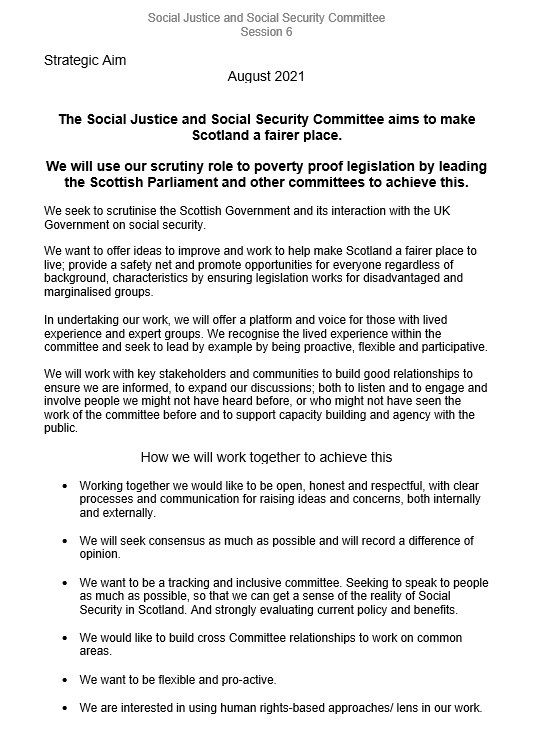Social Justice and Social Security Committee
Annual Report of the Social Justice and Social Security Committee for 2021-22
Infographic Summary
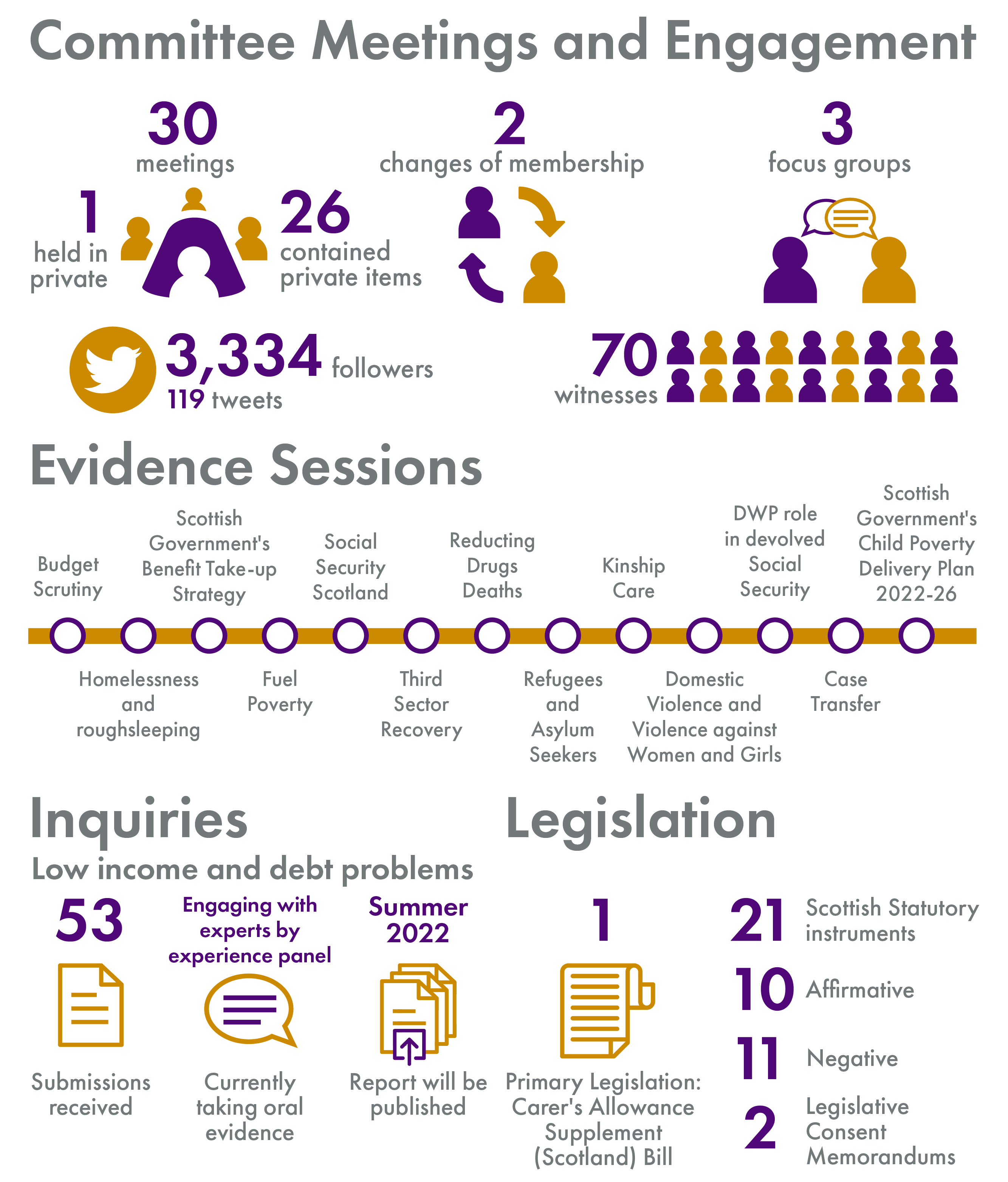
Introduction
Our remit is to consider and report on matters falling within the responsibility of the Cabinet Secretary for Social Justice, Housing and Local Government, excluding matters relating to local government, housing and planning.
This report covers the work of the Social Justice and Social Security Committee during the parliamentary year 13 May 2021 to 12 May 2022.
Due to the COVID-19 pandemic the Committee continued to meet on a virtual or hybrid basis. Throughout the parliamentary year the Committee met thirty times; ten meetings were held virtually and twenty held in a hybrid format. Of these meetings three were wholly in public, one in private and sixteen were a mixture of public and private. The Committee took evidence from 70 witnesses.
Membership changes
There were two membership changes.
Neil Gray left the Committee on 25 January 2022 and was replaced by Elena Whitham.
Marie McNair left the Committee on 29 March 2022 and was replaced by Paul McLennan.
Strategic aims
The Committee discussed its strategic vision for this parliamentary session at its Business Planning Day in August 2021. The full document is included in the annexe. We agreed that:
The Social Justice and Social Security Committee aims to make Scotland a fairer place. We will use our scrutiny role to poverty proof legislation by leading the Scottish Parliament and other committees to achieve this.
Our strategic aims will be used to determine both areas of work and the approach that we take towards carrying out this work. We have agreed to review these aims throughout the session.
Committee Engagement
A key part of our strategic aim is to offer a platform and voice for those with lived experience and expert groups. We recognise the lived experience within our membership and seek to lead by example by being proactive, flexible and participative.
We used a variety of methods to gather information including informal virtual focus groups in addition to formal evidence sessions. Virtual meetings made it easier for us to hear from people across Scotland without the requirement to travel to the Parliament in Edinburgh.
The Committee held 3 focus groups over the course of the parliamentary year covering the topics of low income and debt, fuel poverty and kinship care.
Inquiry into low income and debt problems
In November 2021, the Committee held an informal evidence session with money advisers and people on low incomes with debt problems. The issues raised as part of this focus group formed the basis of our inquiry and the framework for the Committee's call for views.
Some of the people who took part in this focus group have formed an 'experts by experience' panel who have continued to engage with the Committee throughout this piece of work. We have worked in partnership with trusted organisations to provide the panel with further information on the issues being discussed and parliamentary processes. We plan to continue to engage with the panel to empower them to have an active role in the decision-making process.
The Committee launched its inquiry on 15 February 2022 and received 53 submissions during its consultation period. The Committee is currently undertaking oral evidence as part of this work. Following this the Committee will issue a report. We are grateful to everyone who has shared their views with the Committee so far.
Visits
In this parliamentary year the Committee has visited the Social Security Scotland headquarters in Dundee on two separate occasions (1 November 2021 and 29 April 2022). This allowed Committee members to see first hand how the Social Security Scotland administer Scottish benefits.
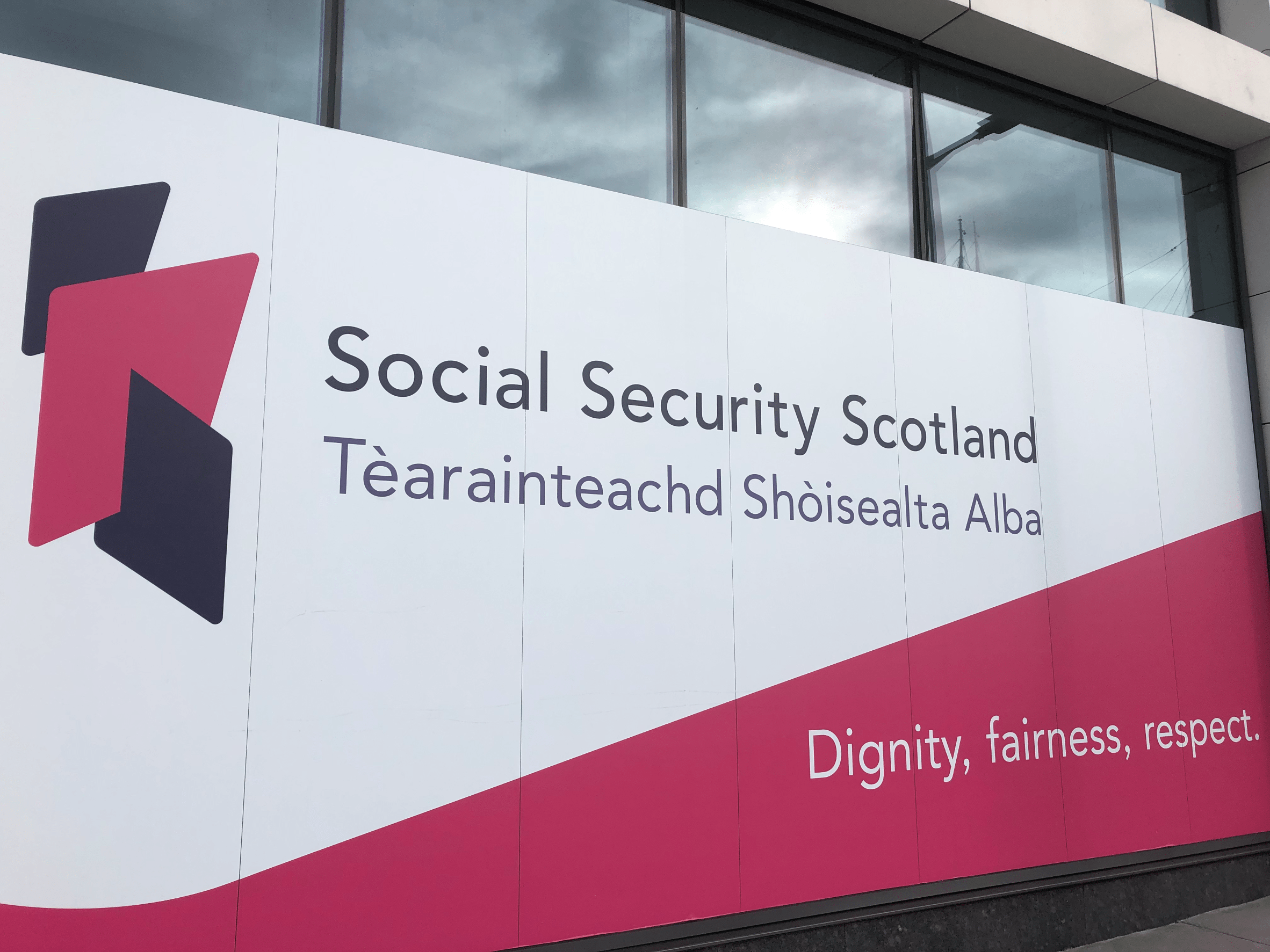
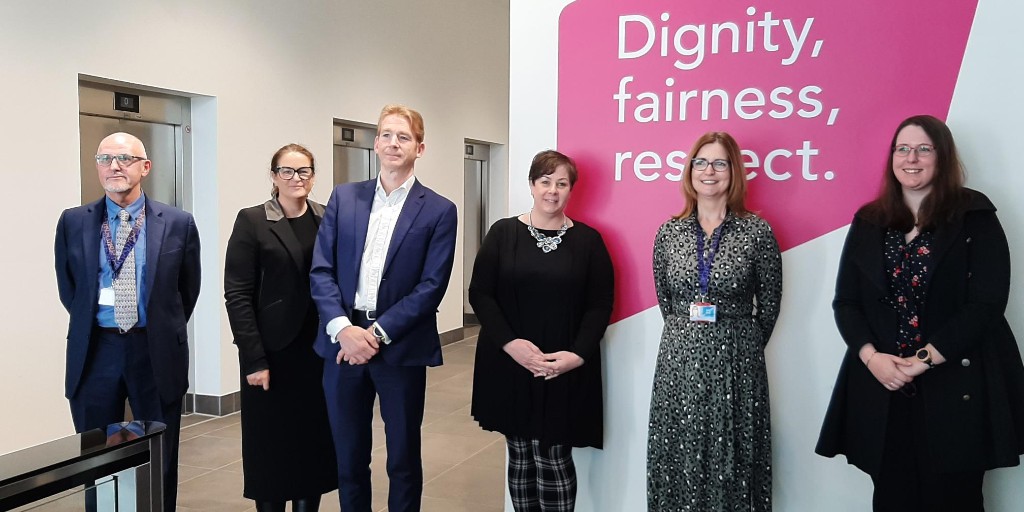
Collaborative working
Our aim is to build cross committee relationships and work collaboratively during the session to raise awareness of social justice issues. Due to the wide ranging remit of the Committee there have been numerous opportunities for the Committee to engage with the work of other Committees and for Committees to engage with our work.
Members of the Committee have attended Local Government, Housing and Planning (LGHP) Committee on part 4 of the Coronavirus Recovery and Reform Bill and members of the LGHP Committee attended our session on homelessness and rough sleeping.
Committee Members have also attended a meeting on Health inequalities held by the Health, Social Care and Sport Committee, and Fuel Poverty sessions held by the Net Zero, Energy and Transport Committee.
As highlighted in the Criminal Justice Committee's report on the delivery of Scottish justice sector reforms, our work on violence against women and girls (detailed below)complemented the work of the Criminal Justice Committee.
Where possible the Committee is also keen to collaborate on a cross-parliament as well as a cross-committee basis. In July 2021, Neil Gray MSP, Stephen Timms MP, Paula Bradley MLA and Jenny Rathbone MS together wrote to the Secretary of State for Work and Pensions as Conveners of the equivalent Scottish Parliament, Welsh Seneddand Northern Irish Assembly committees to urge the UK Government to continue to provide the £20 per week uplift to Universal Credit and Working Tax Credit. The Committee received a response on 5 August 2021.
Reducing drug deaths in Scotland
The Committee held two joint meetings with the Criminal Justice and Health, Social Care and Sport Committees to consider the progress made in implementing the recommendations of the Scottish Drug Deaths Taskforce. These meetings were held on 1 February and 2 February 2022. A Chamber debate on this issue is due to take place on 31 May 2022 with a further meeting expected to be scheduled in September 2022.
Legislation
The Committee has considered one piece of primary legislation and 21 pieces of secondary legislation during this reporting year.
Primary legislation: Carer's Allowance Supplement (Scotland) Bill
The Committee began its work this parliamentary year by considering the Carer's Allowance Supplement (Scotland) Bill. The bill was introduced in the Parliament on 22 June 2021, with the aim to increase the amount of the carer’s allowance supplement for the period from 1 October 2021 to 31 March 2022.
In order for the December 2021 payment of Carer’s Allowance Supplement to be made at the increased rate set out in the Bill, it needed to have received Royal Assent and be in force by November 2021. To meet this deadline the scrutiny timetable was compressed. The Committee launched a call for views on 2 July until 12 August 2021 and received 131 written submissions. Submissions were received from individual carers and from organisations.
The Committee published its Stage 1 report on 13 September 2021, which supported the general principles of the Bill. The Stage 1 debate was held on 23 September 2021. The Committee completed Stage 2 on 30 September 2021. Stage 3 proceedings took place on 7 October 2021 and the Bill became law on 15 November 2021.
Subordinate Legislation
Consideration of draft regulations forms an important part of the Committee's work. We continued to consider the detail of and eligibility for the new Scottish forms of social security. We considered 21 Scottish statutory instruments (10 affirmative, 11 negative).
Draft regulations for each new Scottish social security benefit are subject to a “super-affirmative” procedure – consideration of (and often consultation on) proposed draft regulations , enabling amendments to be made, before draft regulations are laid. The Scottish Commission on Social Security (SCoSS) undertakes this pre-Parliamentary scrutiny and publishes its findings and recommendations in reports to the Scottish Government. The Scottish Government must then publish its response to the SCoSS report when laying regulations. The Committee is grateful to SCoSS for its work in scrutinising these regulations.
Legislative consent memorandum
The legislative consent memorandum (LCM) process enables the Scottish Parliament to signal whether it agrees to the UK Parliament legislating in matters devolved to the Scottish Parliament or altering the executive powers of the Scottish Ministers.
The Committee has considered two LCMs during the reporting year on the following Bills:
Thematic evidence sessions
As part of our work programme we explored the breadth of our remit with stakeholders through a series of stand-alone thematic evidence sessions. These will be used to help determine the priorities for our future work.
Homelessness and rough sleeping
On 4 November 2021 we held a formal evidence session on homelessness and rough sleeping. The Committee wrote to the Cabinet Secretary for Social Justice, Housing and Local Government on 14 December 2021 to highlight the evidence heard. This letter was also sent to the Convention of Scottish Local Authorities (COSLA). Responses were received from the Scottish Government on 24 January 2022 and COSLA on 31 January 2022.
Third sector recovery
On 9 December 2021 the Committee heard from representatives from third sector organisations and support bodies on the impact of the COVID-19 pandemic on Scotland’s third sector. The Committee ensured they heard from both national regulatory bodies, support bodies, and those with a more local and organisation specific perspective.
Refugees and asylum seekers
The Committee held two evidence sessions on asylum seekers and refugees in Scotland on 3 and 10 February.
The sessions focused on the following issues:
No-recourse to public funds.
the Afghan Citizen Resettlement Scheme
UK Government’s Nationality & Borders Bill
The Committee wrote to the Cabinet Secretary for Social Justice, Housing and Local Government on 13 April 2022 to raise concerns about the accessibility of the Scottish Government’s Young Scot/National Entitlement Card (NEC) under 22s Bus Travel Scheme for young refugees and asylum seekers. A response was received on 13 May 2022 from the Minister for Transport.
Kinship care
The Committee held a formal evidence session on Kinship care on 24 February 2022. The session focused on the following issues:
Challenges faced by kinship carers when accessing support.
How support could be improved in this session of Parliament.
Progress on taking forward the recommendations of the 2018 National Review of Care Allowances.
On 21 March 2022 the Committee held an in person focus group for kinship carers. This was held in private to give kinship carers an opportunity to share their lived experience in confidence. An anonymised note was recorded at the session.
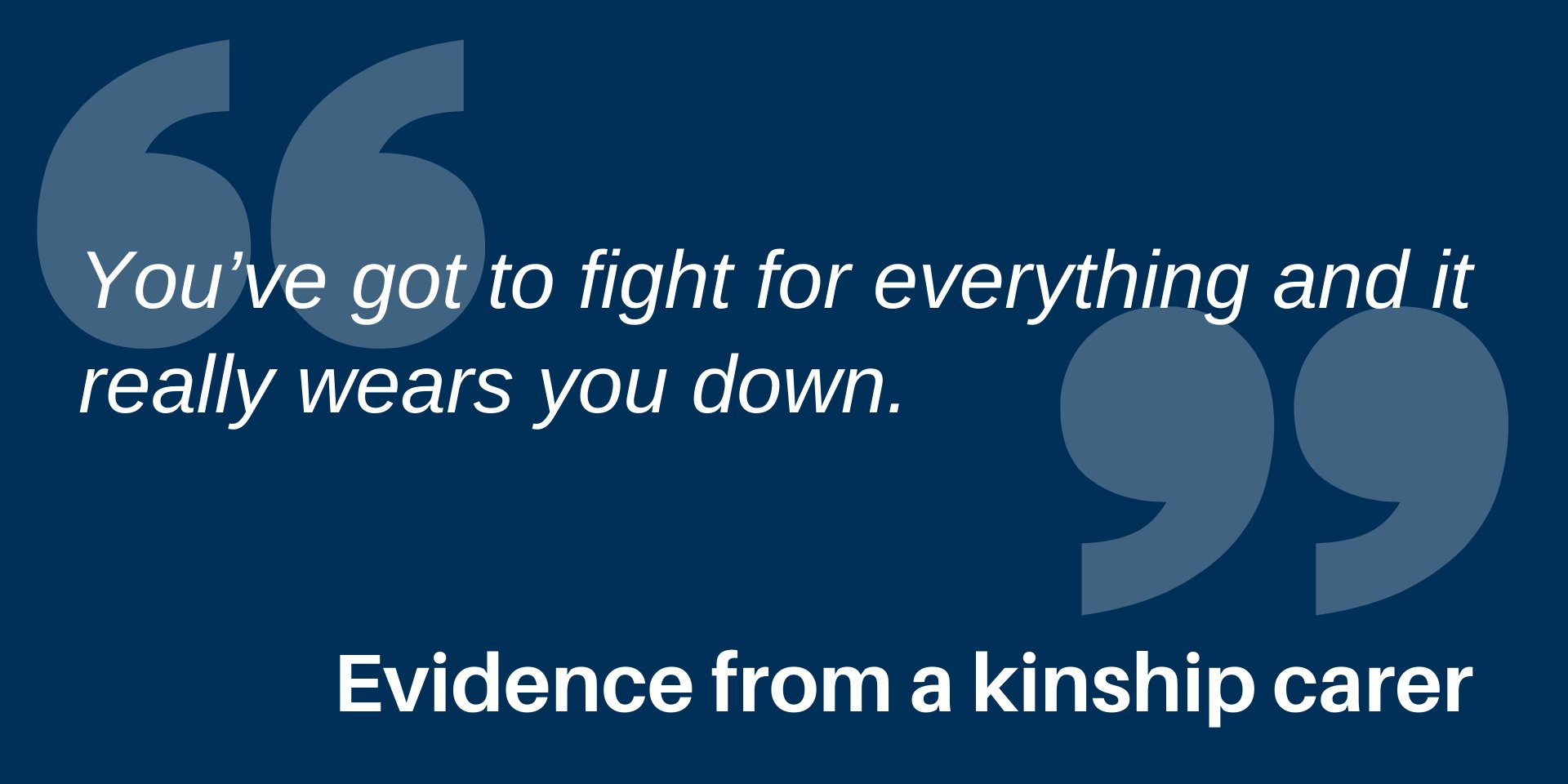
The Committee held a formal evidence session with the Minister for Children and Young People on 31 March 2022 to discuss the issues raised in the previous sessions. At this meeting the Committee agreed to publish a short report.
Violence against women and girls
The Committee held an evidence session on 3 March 2022 to hear from stakeholders and organisations that support women and girls who have experienced violence. To inform this session the Committee met informally with the Lord Advocate and the National Procurator Fiscal for Domestic Abuse on 2 March 2022.
Following the evidence session the Committee wrote to the Scottish Government and Hon. Lady Poole QC, Chair of the independent inquiry into the handling of Coronavirus (COVID-19) in Scotland. The Committee asked that the impact on women and girls be specifically addressed by the inquiry. A response was received from the Scottish Covid-19 Inquiry on 6 May and the Scottish Government on 18 May 2022.
Fuel poverty
The Committee agreed to examine the Scottish Government’s approach to tackling fuel poverty in its Tackling Fuel Poverty Strategy. We wanted to consider if the strategy meets the needs of low income households, especially given the impact of fuel price rises and the pandemic on those households.
On 25 November 2021, the Committee held a formal evidence session to hear from stakeholders who work to support and assist individuals experiencing fuel poverty. They also met informally with people with lived experience of fuel poverty, to explore issues relevant to disabled people, single parents and those living in rural and island communities. Following these sessions the Committee wrote to the Scottish Government on 14 December 2021 and the Net-Zero, Energy and Transport Committee, who were also looking at the Strategy. The Scottish Government responded to our letter on 22 December 2021.
Social Security
Under the Scotland Act 2016, legislative competence for certain areas of social security were devolved to the Scottish Parliament. These new powers relate mainly to disability and carer benefits, but also include some low income benefits.
Almost all of the new powers were devolved by April 2020. However many ‘devolved’ benefits are still run by the Department of Work and Pensions (DWP) under Agency Agreements. A key area of work for the Committee is looking at how and when these benefits are being delivered by Social Security Scotland (an executive agency set up in 2018).
The Committee has a keen interest in the continued roll-out of the Scottish Government's social security programme over the next 5 years.
Social Security Scotland
The role of Social Security Scotland is pivotal in ensuring the delivery of devolved benefits embodies the principles of dignity, fairness and respect as promised during the passage of the Social Security (Scotland) Act 2018. The Committee is keen to continue to build a good working relationship with Social Security Scotland to understand its priorities and challenges in delivering Scottish social security.
The Committee held a formal evidence session on 2 December 2021 to examine the 2020-21 annual report and accounts of Social Security Scotland. We also made 2 visits to the Social Security Scotland Headquarters in Dundee.
Case transfer
On 31 March 2022 the Committee held a formal evidence session with the Minister for Social Security and Local Government. This session was an opportunity for members to discuss arrangements for case transfer from DWP to Social Security Scotland for those on disability benefits.
Scottish Government's Benefit Take-up Strategy
The Committee held a formal evidence session with the Minister for Social Security and Local Government on 11 November 2021. This was to scrutinise the Scottish Government's Benefit Take-up Strategy which was published on 21 October 2021.
DWP role in devolved Social Security
The UK Minister for Disabled People, Health and Work gave evidence to the Committee on 10 March 2022 to discuss how the DWP is supporting the Scottish Government in its implementation of the social security provisions of the Scotland Act 2016. Following the session the Committee wrote to the UK Government and Scottish Government on 1 April 2022. The Scottish Government responded on 29 April 2022 and the UK Government responded on 3 May 2022.
Budget scrutiny
The focus of our budget scrutiny was on the spending needed in 2022-23 in order to meet the interim child poverty targets in 2023-24.
The Committee took pre-budget scrutiny evidence at its meetings on 16 September 2021 and 7 October 2021. The Committee wrote to the Cabinet Secretary for Social Justice, Housing and Local Government on 29 October 2021. The Cabinet Secretary responded to this letter on 9 December 2021.
The Committee took further evidence on the Scottish Budget on 23 December 2021 and from the Cabinet Secretary on 13 January 2022. The Committee then wrote to the Cabinet Secretary on 14 January 2022. A response was received on 21 January 2022.
Medium-Term Financial Strategy and Resource Spending Review Framework
To develop its work on the budget, on 17 March 2022 the Committee held a formal evidence session on two financial planning documents; the Medium-Term Financial Strategy (MTFS) and Resource Spending Review Framework. Following this meeting the Committee wrote to the Scottish Government on 25 March 2022 about the framework for the Resource Spending Review.
Scottish Government's Child Poverty Delivery Plan 2022-26
The Committee held a formal evidence session on 21 April 2022 to hear stakeholder views following the publication of the Scottish Government's "Best Start, Bright Futures: tackling child poverty plan 2022 to 2020". This linked to the Committee's consideration of the budget and broader issues around poverty.
Annexe
